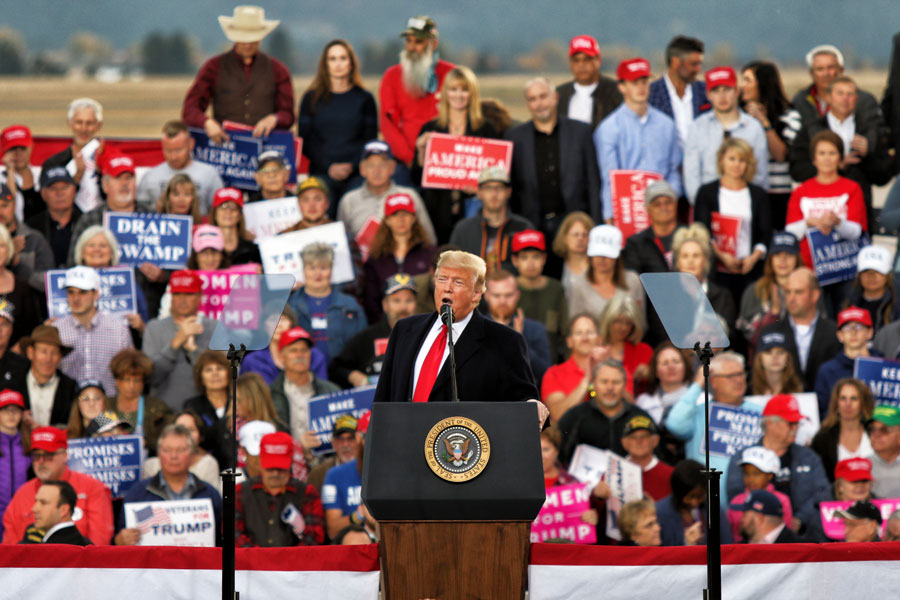Montana Voters Pick President, Senate, House Candidates
In-person voting was available in all counties but the number of polling stations was limited in many jurisdictions due to the coronavirus
By Associated Press
BILLINGS – Montana voters are deciding if Republican Sen. Steve Daines will be replaced by two-term Gov. Steve Bullock in a contest that could determine if Democrats gain control of the U.S. Senate.
Voters also will select candidates for president, governor, U.S. House and whether to allow recreational marijuana.
In-person voting was available in all counties but the number of polling stations was limited in many jurisdictions due to the coronavirus. Polls close at 8 p.m.
More than a half-million absentee votes had been cast prior to Election Day.
PRESIDENT
President Donald Trump and former Vice President Joe Biden are facing off at the top of the ticket.
Trump won Montana four years ago by 20 percentage points. Republican officials in Montana who were initially lukewarm to the flamboyant former real estate developer have lined up reliably behind him ever since.
He campaigned repeatedly in the state in 2018 after taking a personal interest in toppling the state’s senior U.S. senator, Jon Tester.
Barack Obama and Biden lost Montana narrowly in the 2008 presidential election, and then by a wider margin in 2012. Analysts say Trump remains widely popular in the state but there have been signs that’s slipping, including Tester’s victory two years ago.
SENATE
In the U.S. Senate race, Daines was seeking to fend off a strong challenge from Bullock. The race could help decide the balance of power in the chamber, where Republicans held a 53-47 advantage heading into the election.
Daines’ campaign leaned heavily on strong support in Montana for President Donald Trump. Daines warned that a Democratic takeover of the Senate would threaten gun rights and public safety.
Bullock and Democratic groups outspent Daines and his backers by a wide margin. They touted Bullock’s expansion of Medicaid prior to the pandemic and highlighted Daines’ past votes against the Affordable Care Act.
GOVERNOR
Bullock’s lieutenant governor, Democratic Mike Cooney, was facing off against U.S. Rep. Greg Gianforte in the gubernatorial race. Bullock was prevented by term limits from seeking a third term.
Gianforte spent more than $7 million of his personal fortune on the race and promoted his success as a software company entrepreneur. He lost a bid for governor four years ago and gained national attention when he body slammed a reporter on the eve of his election to the U.S. House in a 2017 special election.
Cooney is a career public servant and politician who during the campaign emphasized his long public service and the Bullock administration’s record on health care and combating the coronavirus.
Gianforte’s bid for governor opened up the state’s sole seat in the House.
HOUSE
Republican State Auditor Matt Rosendale and former state Rep. Kathleen Williams were vying for the post.
Rosendale first ran for U.S. House in 2014, losing the primary in a crowded field and narrowly lost his attempt to unseat Democrat U.S. Sen. Jon Tester in 2018. The former real estate developer hitched his campaign to President Donald Trump and stuck to the Republican party line, promising to protect the Second Amendment and end illegal immigration.
Williams, 59, focused her campaign on her career in environmental conservation, and the promise of improved health care and public lands protection. She ran for the seat two years ago and came within five points of victory. She would be the first Democrat to win the seat in more than 20 years, and Montana’s first congresswoman since Jeannette Rankin won the seat in 1940.
MARIJUANA
A pair of Montana ballot measures would legalize and tax marijuana for people over the age of 21.
Supporters touted recreational marijuana as a way to raise revenue, allow military veterans to use marijuana for post-traumatic stress symptoms and reduce law enforcement costs involving the possession of small amounts of marijuana.
Opponents argued legalization would lead to increased drugged driving, more crime, and would not eliminate the black market because legal marijuana would be taxed at 20%.